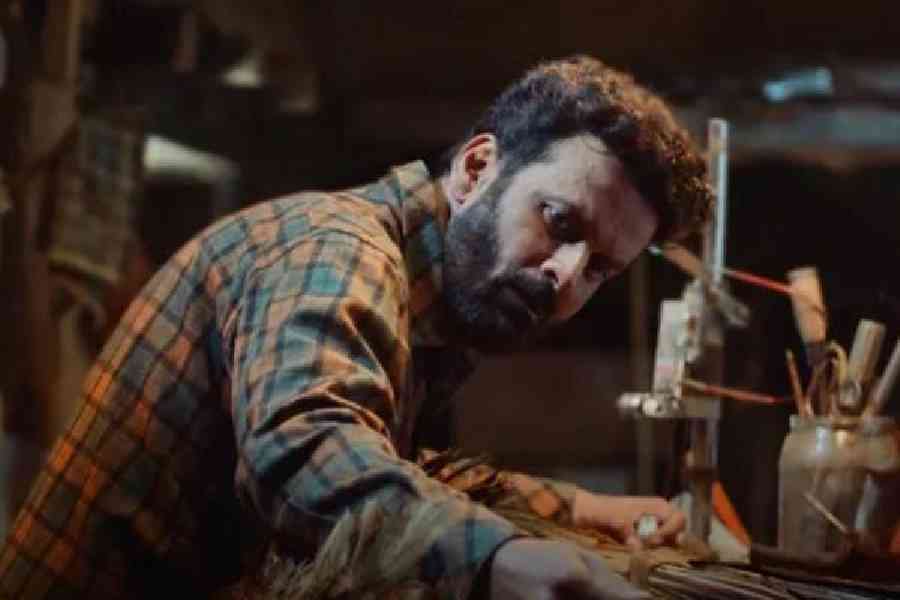The real and the magical collide pretty early in Jugnuma. Translating roughly to ‘firefly’ (jugnu) ‘tale’ (nama), the sophomore directorial of National Award-winning filmmaker Raam Reddy is distinguished by a surreal yet warm moodiness. It commences with a single continuous shot. One that defines the rest of this film which is quite unlike anything the Indian space has seen.
Dev (Manoj Bajpayee) walks out of his British-styled bungalow that breaks through the mist-capped hills somewhere in the northern part of the country. The camera feverishly follows his back as he makes his way to the outhouse in front, nodding a greeting to those who come within his eye view. Once inside the outhouse, he carefully slips on what look like a pair of giant feathered wings, walks out to the edge of a wooden board jutting out of a cliff and jumps off it. A few seconds later, we see Dev’s silhouette, the wings attached to his back, gloriously ‘flying’ around. It is a beginning that immediately arrests attention, making you want to know more, even as you are entranced by the mesmerising and mellifluous atmospherics of the film.
It is this vibe that carries Jugnuma through, the silences of this metaphysical mystery speaking much more than its words could ever aim for. Post that wondrous opening shot, though, we witness a family like any other. Dev — whose surname is never mentioned, deliberately or otherwise — lives with his wife Nandini (Priyanka Bose) and son Juju (Awan Pookot) in a large estate inherited from his grandfather. Its sprawling grounds house orchards. Dev is “saab” for the villagers in the vicinity, many of who work in the orchards and he has his reliable man Friday Mohan (Deepak Dobriyal) to take care of things (some of which involve the increasingly nasty proceedings that greet Dev soon enough).
The calmness of their existence, in more ways than one, is marred by the arrival of the teenaged daughter Vanya (Hiral Sidhu) for summer break. At the same time, despite Dev’s strict vigilance, fires break out inexplicably by night in his orchards. The trust between him and the villagers — many of who are against his use of pesticides — is splintered. At the same time, Vanya’s sexual awakening of sorts coincides with a group of nomads visiting the area, with her striking an unlikely bond with one of them. But as tensions rise, what was once a harmonious co-existence feels increasingly threatened.
There is very little in Jugnuma, which is now playing in theatres, that is spelt out. As a viewer, you are invited to feel more than understand, experience more than seek an explanation. Reddy, a filmmaker known for his interest in and aptitude for magic realism, imbues his fable-like film with an untouched, old-world charm.
The year is 1989, which instantly means the absence of modern-day technology, thus contributing to the isolated feel of its players as well as its narrative. The screenplay reportedly went through 36 drafts over a nine-year development period, resulting in a 378-page storyboard. The hard work and heart put into the film shows.
The tension is searing in Jugnuma, but Sunil Borkar’s camera manages to seek out the calm in the chaos. With an approach and story quite unlike his equally gripping debut Thithi, Reddy shoots Jugnuma in 16mm stocks and uses deliberate underexposure to lend it a naturalistic look. There is beauty to be seen in every frame of Jugnuma, the standout being that jaw-dropping shot of Dev being surrounded by hordes of fireflies at night. It is a moment of beauty for the viewer and one of epiphany for the protagonist.
What helps Jugnuma — which, to be honest, is an acquired taste — is the fact that the performances all-round are impactful. Bajpayee once again shows what makes him one of the best we have. As Dev, he switches seamlessly between angry boss, doting family man and, more importantly, a gleeful kid excited to try out his new wings. The sense of freedom it gives him is unparalleled, mirroring our own feelings of exhilaration melding with the fear of the unknown every time we take a leap of faith. Priyanka Bose and Deepak Dobriyal are, as expected, extremely effective in their parts, while Tillotama Shome makes an impression even in a relatively brief role.
Jugnuma, even in the real world, encourages you to embrace the magical. While that may neither be practical nor accessible, comfort lies in the fact that one can always dream. Much like what the film is.










